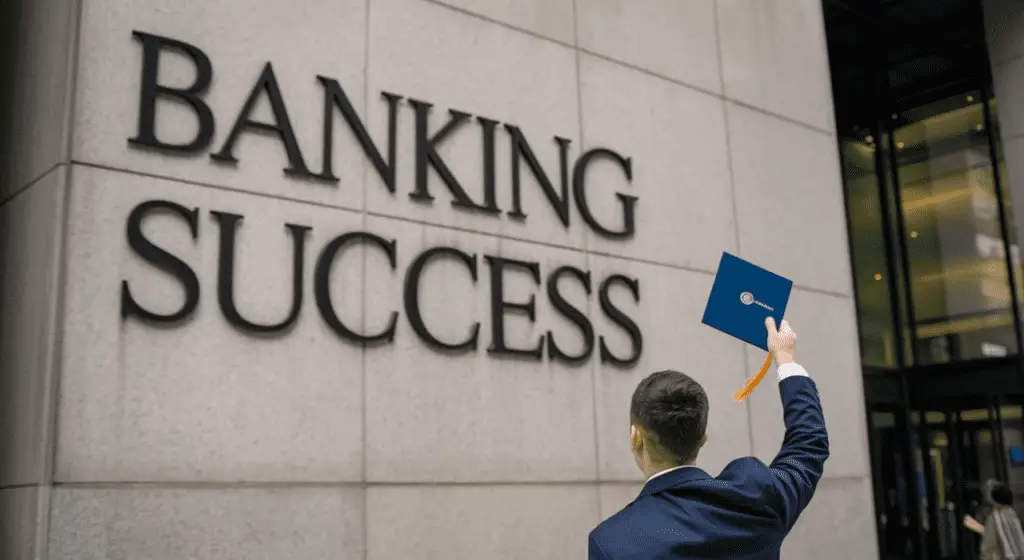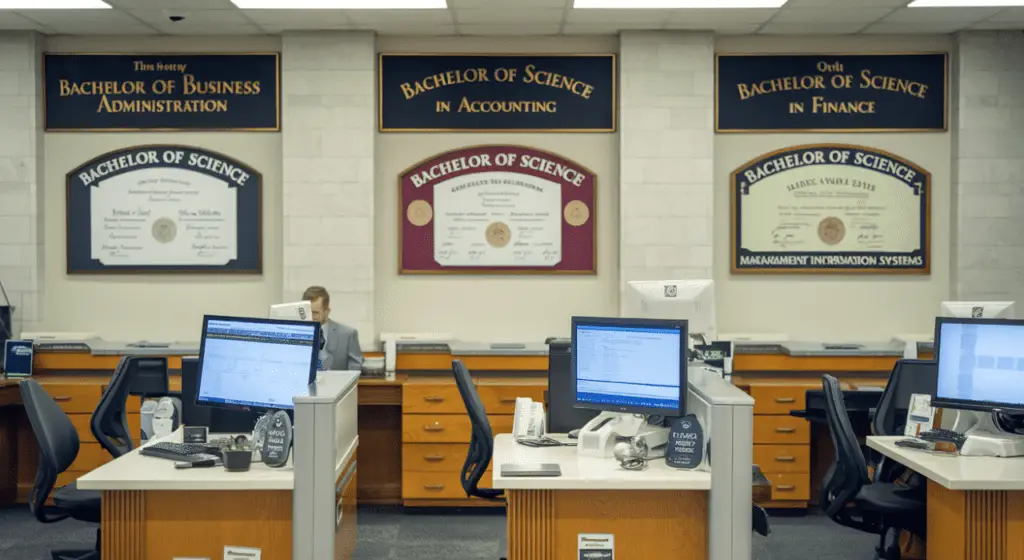Looking to start a banking career? Degrees in finance, economics, accounting, or business administration are ideal for building skills like financial management, market analysis, and leadership. Explore your options to find the best path for your goals in the financial sector.
What are some good degrees to get an entry-level job for students at a bank?
Good degrees for an entry-level banking job include finance, accounting, economics, and business administration. These fields teach essential skills like financial analysis and problem-solving. A degree in these areas builds a strong foundation for starting a banking career.
Table of Contents
Which degrees best prepare students for banking careers?

Degrees in finance, accounting, economics, and business administration offer valuable skills for banking careers. These programs teach students about financial systems, data analysis, and decision-making. Strong foundations in math, problem-solving, and communication gained through these degrees prepare students to thrive in various roles within the banking industry.
1. Finance and Accounting
These degrees focus on managing money, analyzing data, and preparing financial reports. They provide essential skills for roles like financial analyst or accountant, making them popular choices for banking professionals.
2. Economics
Economics teaches students how markets work and how to make informed decisions. It sharpens analytical thinking and is perfect for roles in investment banking or economic research.
3. Business Administration
This degree covers a mix of management, marketing, and finance, offering a well-rounded skill set. It’s ideal for leadership roles in banking, like branch managers or project coordinators.
Top-degree choices for landing entry-level bank positions
Landing an entry-level position in banking often requires the right educational foundation. Certain degrees equip candidates with the skills and knowledge that banks highly value.
Below, we explore the top academic programs that pave the way for a successful career in the banking sector, along with their practical applications in various roles.
| Degree | Skills Gained | Relevance to Banking | Potential Roles |
| Finance | Financial analysis, investment strategies, risk management | Critical for evaluating investment options, managing assets | Financial Analyst, Credit Analyst |
| Accounting | Managing financial records, tax compliance, budgeting | Essential for maintaining accurate financial statements | Accountant, Auditor |
| Economics | Market analysis, economic forecasting, decision-making | Helps understand market trends and banking operations | Investment Banker, Economic Research Analyst |
| Business Administration | Leadership, strategic thinking, project management | Prepares for managerial roles and client relations | Branch Manager, Relationship Manager |
| Mathematics | Quantitative analysis, statistical modeling, problem-solving | Crucial for roles requiring numerical precision and forecasting | Risk Analyst, Actuarial Scientist |
| Computer Science | Programming, data management, cybersecurity | Increasingly important for technology-driven banking tasks | Software Developer, IT Security Specialist |
| Marketing | Consumer behavior, branding, communication | Supports customer relationship management and service offerings | Sales Specialist, Customer Relationship Manager |
| Data Analytics | Data interpretation, predictive modeling, business intelligence | Vital for decision-making and financial trend analysis | Data Analyst, Financial Planner |
Is your degree the key to banking success?

Your degree can open doors in banking, but it’s not the only key to success! Whether you’re just starting or looking to grow, combining your education with essential skills, networking, and real-world experience can set you apart. Here’s how to make your degree work for you in banking:
1. Build Your Banking Basics
Start by understanding the fundamentals of banking—finance, economics, and customer service. Your degree provides a solid foundation, so focus on applying your knowledge to real-world scenarios.
2. Sharpen Your Soft Skills
Success in banking requires more than numbers. Develop communication, problem-solving, and teamwork skills. These are crucial for building trust with clients and thriving in teams.
3. Network Your Way In
Tap into alumni networks, attend industry events, and connect with professionals on LinkedIn. A strong network can lead to valuable opportunities and insider knowledge about the industry.
4. Gain Real-World Experience
Internships, part-time roles, or shadowing opportunities can give you hands-on experience. Use these chances to learn, grow, and better understand how the banking world works.
Can these degrees fast-track your banking career path?
Certain degrees can definitely fast-track your banking career. Whether it’s finance, economics, or business administration, these programs equip you with the skills and knowledge needed to thrive in the competitive world of banking. Let’s break it down to explore how the right degree can make a difference:
1. Build a Strong Foundation
Degrees in finance or economics teach you the basics of money management, risk analysis, and investment strategies. This knowledge is crucial for excelling in banking roles and gives you a competitive edge.
2. Open the Door to Networking
Many degrees offer internship opportunities and connections to industry professionals. These experiences can give you a head start in the job market, landing you introductions to key players in the banking world.
3. Accelerate Career Growth
Specialized degrees often lead to faster promotions. With a targeted education, you’re better prepared for advanced roles, from financial analyst to investment banker, helping you climb the career ladder quickly.
What academic paths lead to success in banking jobs?

- Finance or Accounting Degree
A degree in finance or accounting gives you a strong foundation in managing money, analyzing data, and understanding financial systems. These skills are essential in most banking roles. Plus, employers value candidates with specialized knowledge.
- Economics Education
Studying economics helps you understand markets, trends, and global financial systems. This background is perfect for roles in investment banking or economic analysis. It’s all about seeing the big picture and making informed decisions.
- Business Administration
A degree in business administration combines finance, management, and leadership skills. It’s versatile and prepares you for careers in banking management, client relations, or financial planning. A solid choice for a broad skillset!
- Mathematics or Statistics
If you love numbers, a degree in math or stats can open doors to roles like financial modeling or risk analysis. Banks value analytical thinkers who can interpret data and forecast trends accurately.
- Law Degree
A law degree can be an asset in compliance, regulatory, or corporate banking roles. Knowing the legal side of finance ensures businesses stay on the right track. It’s a unique but valuable path in the banking world!
How to Make the Most of Your Degree
1. Gain Practical Experience
Internships and co-op programs are invaluable for gaining hands-on experience. Look for opportunities to work in areas such as customer service, credit analysis, or fintech innovation.
2. Build a Professional Network
Networking with industry professionals can open doors to internships and full-time roles. Attend job fairs, join banking associations, and connect on LinkedIn.
3. Stay Updated on Industry Trends
Keeping pace with banking innovations such as digital transformation, AI, and blockchain can provide a competitive edge.
Conclusion
In summary, choosing the right degree for a career in banking requires careful consideration of your interests and career goals. If you’re wondering, “What are some good degrees to get an entry-level job for students at a bank,” there are several great options.
Studying economics equips you with a deep understanding of markets and financial systems. A degree in business administration offers a versatile skillset for roles in banking management and client relations.
A math or statistics degree can lead to roles in financial modeling and risk analysis, while a law degree is ideal for compliance and regulatory positions. The right degree is key to building a successful banking career.
FAQs
Which degree is best for a banking career?
A degree in finance, economics, accounting, or business administration is ideal for a banking career. These programs teach essential skills like financial analysis and risk management. They’re widely recognized by banking employers.
Which professional degree is best for banking?
The best professional degree for banking is an MBA in Finance. It gives you advanced knowledge in banking operations, investment strategies, and leadership, making you stand out for high-level roles.
Banking and finance degree salary?
A banking and finance graduate’s salary can range from $50,000 to $120,000 annually, depending on the role, experience level, and location. Entry-level positions may start lower but grow quickly with experience.
What banking job pays the most?
Investment bankers and financial managers are among the highest-paid in banking, earning six-figure salaries. Roles like private equity managers or hedge fund analysts also top the pay scale.
How to work at a bank for beginners?
Start by applying for entry-level roles like bank tellers or customer service representatives. A degree in finance or business helps, but strong communication and math skills are key for beginners.

